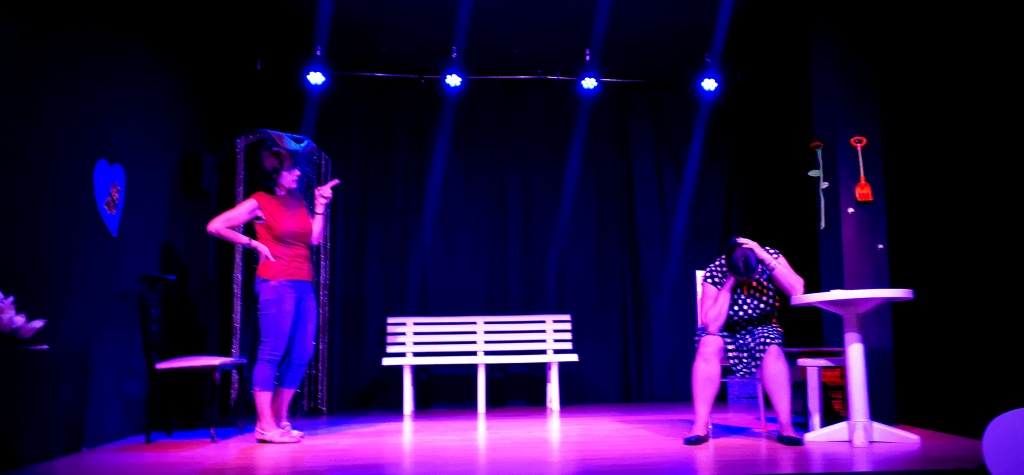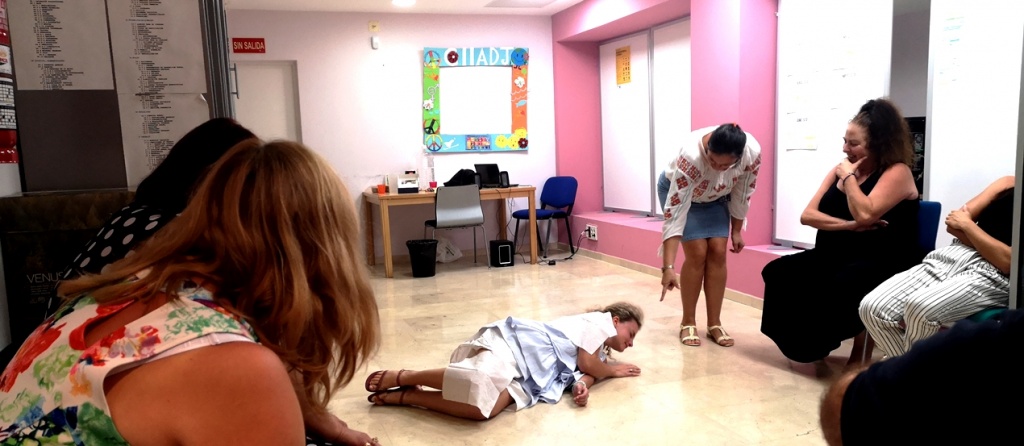Bullying and cyberbullying are very serious and common situations that often have a long term negative impact on the ones involved (behaviour disorders, depression, low self-esteem, early school leaving, unemployment etc.). This course will increase awareness about the different types of verbal, psychological and physical bullying and cyberbullying and empower the participants on how to detect it on time and react when it happens. The course is inspired by the KIVA research-based anti-bullying program that highlights the importance of changing the attitudes and behaviours of the observers/bystanders towards bullying, and not only focusing on the victim and the aggressor. We collaborate an organization specialized in the prevention of bullying and cyberbullying in Tenerife that also focuses on a whole-school approach and the participant role approach to bullying.
The participants will also learn how therapeutic theater can be used to identify possible bullying in class, work with the different roles (observers, victim, aggressor). Through real life stories (live and video), role plays, trust games and other theater techniques and exercises, the participants will learn how to teach and practice emotional intelligence, empathy, trust and active listening. Our trainers will show how to use active learning and experiential learning methodology to teach about bullying and create a respectful and non-vilont learning environment.
The nature of this course is highly practical and hands on, so the participants will experience themselves some of the techniques while also reflecting on how to apply them to their context.
Competences to be acquired:
- Increased knowledge about different types of bullying and cyberbullying.
- Ability to differentiate between normal conflicts and bullying/cyberbullying.
- Knowledge about the KIVA evidence-based anti-bullying program
- Knowledge about the important role of the participants/bystanders/observers in preventing and tackling bullying situations
- Know-how on how to react and help someone suffering from bullying and cyberbullying.
- Increased knowledge about the psychological and physical consequences on the long term (victims, bully and observers).
- Ability to use drama techniques and experiential methodology to increase students empathy, respect, trust and active listening skills
- Understand how to apply active learning methodologies to generate a respectful and non-violent learning environment.
- Exchanged best practices with peers from Europe on how to handle difficult situations with bullying and cyberbullying.
Target audience
Teachers (pre-school, primary, secondary, vocational, adult education centers), teachers trainers, school leaders and other school staff and professional workers who face bullying and cyberbullying situations.
For groups of 8 teachers or more, we adapt the course content and approach to the specific needs of your educational center and offer personalized funding assistance.
Daily programme
Day 1 – Monday – Bullying and cyberbullying
- Welcome to the course
- Ice breaking: Getting to know each other
- Group dynamics: Building trust in the group
- What do you know about bullying and cyberbullying?
- What’s the difference between normal conflict and bullying. Types of bullying.
- Cyberbullying: most popular apps for kids and teenagers.
- Exchanging experiences and good practices on dealing with bullying and cyberbullying
Day 2 – Tuesday – The KIVA method
- Warm up and teambuilding exercises
- KIVA evidence-based antibullying program
- A whole school approach to prevention, intervention and monitoring
- The role of the participants/bystanders/observers in preventing and tackling bullying situations
- How to help someone suffering from bullying and cyberbullying.
- What to do with the bully. How to communicate to the families.
- Basic legal aspects. How to apply protocols
- Reflection: How can we apply the participants‘ role in the classroom?
Day 3 – Wednesday – Real life stories
- Exercises to build trust and active listening
- Exercise in pairs: The importance of eye-contact
- Real life stories (live and/or video testimonials). Celebrities and people like us.
- Understanding the realities of students (and their families) suffering bullying and cyberbullying in nowadays society
- Long term psychological and physical consequences (victims, bully and observers).
- Reflection exercise: How to detect if someone’s suffering bullying or is a bully?
Day 4 – Thursday – Therapeutic theater in bullying
- Energizer and teambuilding exercises
- The benefits of therapeutic theater with bullying prevention and intervention
- Roleplays, exercises and theater techniques
- Exercises to identify and work with role of the participants/bystanders/observers in bullying
- Group dynamics: Reinforcing trust and respect
- Reflection exercises: How can I apply theater techniques in my class?
Day 5 – Friday – Emotional intelligence for bullying prevention
- Active learning methodologies to generate a respectful learning environment and prevent bullying
- Exercises to practice emotional intelligence, empathy, trust, respect and active listening
- Techniques to monitor the classroom climate
- Open discussion on possible future collaborations and planning follow up activities
- Summary of key learning points
- Final course evaluation and feedback
- Validation of learning outcomes and handling certificates
Methodology
We tailor our working methods based upon the participants‘ needs and professional profiles in order to ensure easier adaptability and application of the tools to the real life.
Our standard methodology is based on active learning and it is highly participative and practical. We have a hands on approach that comprises group exercises, role plays, experiments, case studies and simulation exercises. We use collaborative learning techniques to foster the exchange of good practices and collective learning. Our focus is on showing the participants how the learners’ motivation increases when they become the actors of their own learning because the teacher takes the role of facilitator or learning guide. Thus, the participants get the chance to experience on themselves the benefits of the active learning methodology at the same time as learning how to apply it in their classroom.
Energizers, games and group dynamics are foreseen daily in order to ensure a positive energy and a cooperative learning climate in the group.
Group reflections and daily brief feedback sessions are planned to help adapting the learning programme to the specific needs of the participants.
Certification and validation of learning outcomes
- Certificates of attendance
- Support with the Europass mobility certificates – to be issued by the applicant’s National Agency
Upon request, we also provide educational centers with additional documents that are required to certify the presence to the course and the competences learned. For example, we provide photos of the training course.
Pre-register to our course!
Write us some details about your project idea. How many participants do you want to send? What are the profiles of the teachers/staff interested in the course?


